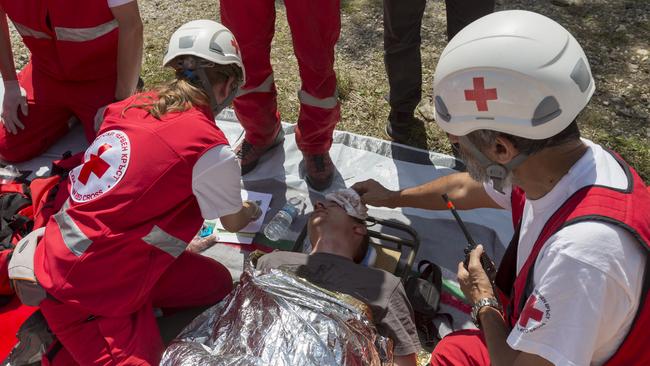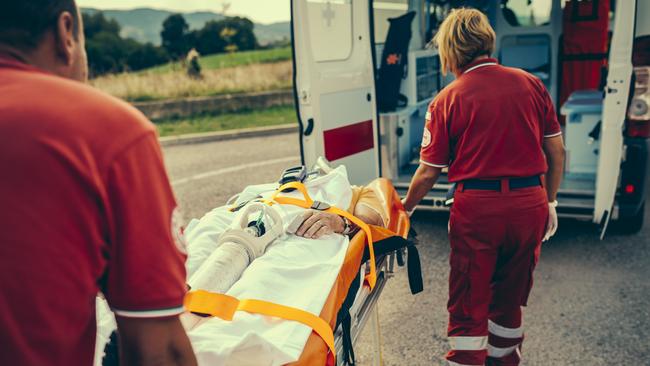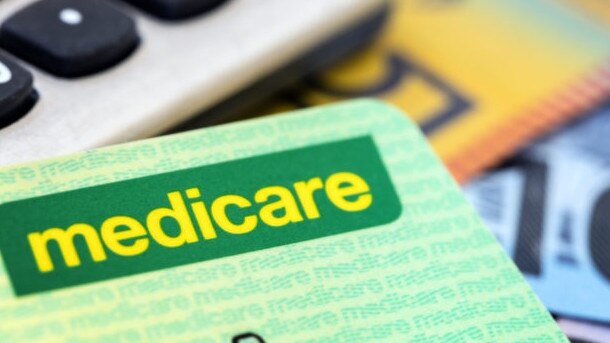‘Don’t do it’: Australians thinking of skipping travel insurance warned it’s a journey into disaster
Izaac Black felt invincible ahead of an overseas surfing holiday and almost skipped buying travel insurance. A scooter accident left his body broken but thankful he paid up. Now he's warning others.
SmartDaily
Don't miss out on the headlines from SmartDaily. Followed categories will be added to My News.
In August 2022 Izaac Black was days into a surf trip in Indonesia when disaster struck.
The 22-year-old surfboard shaper from Margaret River in Western Australia was travelling with friends in remote West Sumbawa when he crashed his scooter.
When the local hospital couldn’t help, Black had to transfer himself to Lombok by ambulance and boat, where he spent two weeks in intensive care with injuries including a collapsed lung, two broken ribs and a fractured sternum.
Black’s mum had persuaded her son to take out a travel insurance policy.

“I felt invincible and thought nothing bad was going to happen to me,” he says. “I also
thought insurance was expensive, but it cost only an extra $150 and I am forever grateful for having it given how things turned out.”
IN THE DARK
A survey compiled by the Insurance Council of Australia (ICA) and the Department of
Foreign Affairs and Trade, published in August 2022, found that one in 20 people who’ve booked a trip intend to travel without insurance, rising to one in 10 in the under 30s. Additionally, an alarmingly high number of Aussie travellers have mistaken beliefs about how much assistance they’ll get from the federal government in the event of an overseas medical emergency. More than two-thirds believe they’ll get medical treatment, 50 per cent believe they’ll be repatriated, and 43 per cent believe the costs will be covered.
Julie Saunders, general manager, Medical Assistance, World Travel Protection, says
people think the government’s response to individual difficulty is the same as a large-scale crisis.

“While a traveller’s crisis is always stressful, it generally does not demand a response from the government and that is where a travel emergency assistance provider is needed,” she says.
ICA CEO Andrew Hall says that accidents and emergencies can happen anywhere, making travel insurance essential. “Also, we all know younger people take more risks, but under-30s travelling without insurance risk not only their health but also crippling medical and repatriation bills,” he says.
SERIOUS CASES
Black’s claim with Southern Cross Travel Insurance totalled $79,277.68. He admits
that without insurance life post-accident could have been quite different, and would
have included needing family help to foot the bill.
“The hospital in Lombok was also suggesting medical procedures we don’t do in Australia anymore,” says Black. “When Southern Cross heard this, they organised an air ambulance to get me home.”
Saunders says there are many cases where significant sums of money have been needed to repay the costs of medical care and repatriation for uninsured travellers.
“People have had to exhaust their savings, rely on family members or friends, or try to raise money through fundraising,” she says. “Some of our serious cases can range from $800,000- $1 million in medical and transport expenses.”

In mid-2022 the family of a Gold Coast man found this out the hard way.
Babis Armenis travelled to Greece to visit his elderly mother for the first time in three years
due to the pandemic, and while there the 58-year-old suffered a stroke and fell down
a flight of stairs sustaining a severe head injury.
After spending 12 days in an induced coma, he was transferred back to Australia on a lifesaving medical repatriation flight, leaving his family with a bill of $415,000.
OTHER ISSUES
While medical expenses are the number one reason to have travel insurance, other
things can go wrong from trip cancellations to lost luggage. Additionally, some
countries, including Singapore and Thailand, require travel insurance to enter, and while Australia has reciprocal healthcare agreements with several countries including New Zealand and the United Kingdom, travelling with a Medicare card only gets you subsidised treatment for essential services.

Hall says common mistakes people make when buying travel insurance include not reading the PDS, not including cover for stopovers, not declaring pre-existing conditions, and not covering risky activities like motorbike riding and skiing.
While Black feels lucky to be alive, he is still not fully recovered and has ongoing issues with his lungs and shoulder.
“I have to say to anyone who’s considering travelling without insurance, don’t do it,” he says.
FIVE TIPS FOR BUYING TRAVEL INSURANCE
• Travel insurance is not one-size-fits-all so do your research.
• Don’t choose a policy on price alone - check inclusions, exclusions, excesses and claim
limits.
• Not all policies automatically cover Covid – it can be an add-on for an additional cost.
• Read the product disclosure statement (PDS) before you buy.
• Check your destination’s Covid requirements and if travel insurance with Covid
coverage is required.
Source: Andrew Hall
Originally published as ‘Don’t do it’: Australians thinking of skipping travel insurance warned it’s a journey into disaster




